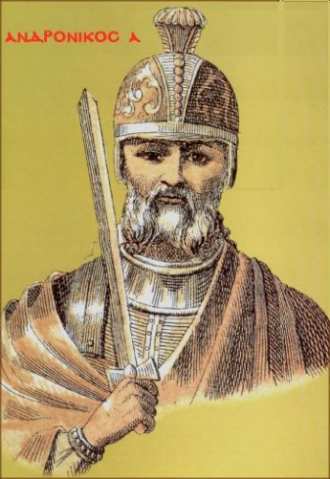|
|
|
Andronicus 1st Comnenus, Byzantine emperor (1183-85), the most questionable personality
of Byzantine History. He had a turbulent life and career and remained one of the the most
interesting figures in Byzantine history. His love affairs were a topic of discussion
in the Byzantine court, while his valiance and courage on the field of the battle were
evidence of a man powerful and able enough to assume supreme authority.
Until his 20's he was a very close friend to his cousin, Manuel I, until the latter,
became emperor, in August 1143. But Andronicus' intention always had been to take the throne,
and begun conspiracies against his cousin. He was thrown to jail in 1154 and after two attempts,
he managed to escape with the help of his faithfull wife, after 10 years of imprisonment.
He begun a life of action, adventure and love affairs. He rode to Hungary and later to
Russia where he was received by prince Giaruslav. Later Andronicus asked asylum to the king of
Jerusalem, Amalarihos I. But the emperor always was after him and threatened anyone who would
protect the traitor. Andronicus met Theodora Comnena, fell in love with her, and they escaped.
They asked asylum to Nuredin, sultan of Syria and Mesopotamia. There they met Saladin who later
will become a hero for all musulmans.
Always fugitives and chased by the emperor (Vasileus), they left Bagdhat and reached
the ancient city Colhis of Kaukasus, where they asked for asylum, to the king of Georgia,
George III, who was brother of Andronicus' former wife. In 1180, Andronicus returned to
the City and asked for forgiveness. The sentimental emperor forgave his cousin, who moved
to the city of Inoi in the coast of Black Sea.
Manuel died and the successor to the throne was his twelve-year old son Alexios II.
Due to the minority of the young emperor, the regency was assumed by his mother Maria.
In reality, however, the power was exercised by the protosebastos Alexios Komnenos who was
particularly hostile to the people. The Byzantine state was in need of a powerful leader in
order to confront the internal and external perils. The cousin of the emperor Manuel,
Andronikos was considered by many the most suitable to assume power.
Andronicus acceded to the throne by murdering all those who considered as a threat to
his power. He strangled the young Alexios, his mother Maria and dozens of others.
In 1182 he caused the slaughter of Constantinople's Westerners. He was a cruel and
notorious ruler, but the same time he was a reformer who tried to remove the social
and economic inequalities. He took strict measures to protect the peasants against the great
landowners, chose competent servants for the
administrative services, enforced honesty on the tax collectors, gave satisfactory salaries in
order to avoid bribery and was the terror of corrupt officials.
He used to say "There is no power enough to stop the emperor's will".
Despite the nobility of his objectives, the means he
used in order to impose his policy were anything but that. Especially in his struggle
against aristocracy, he turned the governing of the state into terrorism.
The laxity of the state in the days of his government gave Hungarians, under the command of
Vellas III, the opportunity to move against him in 1181 and to occupy the regions of Dalmatia,
Croatia and Sirmium. Two years after, Hungarians with Serbs destroyed Beograd, Naissos and
Sophia. Serb king Nemania declared the independence of his state.
Revolutions against the violent regime imposed by Andronikos I, broke out also in Asia Minor.
Furthermore, in 1184 Isaac Komnenos, who was emperor's relative, took over Cyprus, detaching
it from the empire. The worst blow, however, for the empire came from the Normans of Italy
who were under the reign of William II of Sicily.
After assaulting Dyrrachion, and occupying Corfu, Kefallenia and Zante, they moved on
Thessalonike, which was occupied and plundered by them in August 24, 1185. Thessalonike then
was under the command of the incompetent general David Comnenus.
The atrocities of the conquerors are described in a particularly vivid way by the metropolite
of the city Eustathios. The continuance of the Norman march towards the Capital aroused
reactions against Andronikos I. The outraged crowd arrested and tore the last member of the
Komnenos dynasty to pieces in the streets of Constantinople, thus he met a horrible fate, in
September 12, 1185.
This was the end of Comnenus dynasty.


